#villarosa
Text
News Anchor Katy Tur / Linda Villarosa On Racism & Healthcare : Fresh Air : NPR
News Anchor Katy Tur / Linda Villarosa On Racism & Healthcare : Fresh Air : NPR
Katy Tur’s parents ran a helicopter news service in LA in the ’80s and ’90s. While she loved the rush of flight, her family dynamic was a volatile one. We talk about her unusual childhood and her early career in journalism. She’s now an anchor for MSNBC and a correspondent for NBC News. Tur’s memoir is Rough Draft.
1619 Project journalist Linda Villarosa says bias in the healthcare system and the…

View On WordPress
0 notes
Text
my ao3 wrapped 2023

it’s that time of the year again. i had nothing better to do and made a few edits. thanks to the crew for nodding along to my shenanigans. if ya’ll want to have a go feel free to use the template.
tagging: @rebelrayne @whatisreggieshortfor @sunshinejihyun @perfectlysunny02 @csmicletters @ariendiel @beesandfigsart @lucas-koh
#litg#love island the game#litgs2#litgs1#spotify wrapped happened wednesday#took me a moment to make#i didn’t write a lot#on ao3 but tumblr hosts#my fics too#fic: ok roomie#fic: it's the little things#fic: recipe for two#one-shot: black canary#fic: villarosa#what do you mean Villarosa doesn’t exist#😈😈😈
13 notes
·
View notes
Text
can’t recommend the book Under the Skin: The Hidden Toll of Racism on Health in America by Linda Villarosa enough. If there’s one thing Villarosa can do, it’s put a human face to complex issues. Shes a seriously skilled writer and has made me cry many a time
#she really knows how to find a person and get the essence of their story#and humanize them in the face of dehumanization#her chapter about the Relf sisters is devastating. they’re still alive it. villarosa has met them. it wasn’t long ago#another chapter about this man’s lifelong struggle with addiction and untreated mental health#and how desperately he tried to improve himself before being killed by police#it’s gutting. and she doesn’t sugarcoat it. but she also gives hope
2 notes
·
View notes
Photo

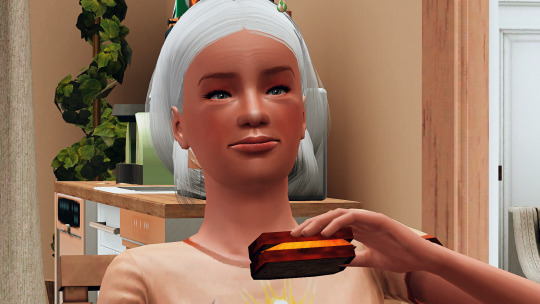


been a while since i saw these two :3
35 notes
·
View notes
Text
Livres de base sur le vêtement

#Riccardo Villarosa#Giuliano Angeli#Bernhard Roetzel#Hector Obalk#Alain Soral#Alexandre Pasche#Kontre Kulture#Lacoste#Pierre Fournier#Anatomica#Dave Hewitson#Jay Montessori#80s casual#Ellesse#Sergio Tacchini#Chanel#Géraldine de Margerie#Olivier Marty#Patrick Kapferer#Tristan Gaston-Breton#Marc Beaugé#Jean Rouzaud#Gauthier Borsarello#Fursac#French Ivy#BCBG#Homo Elegans#Hédi Slimane
6 notes
·
View notes
Text
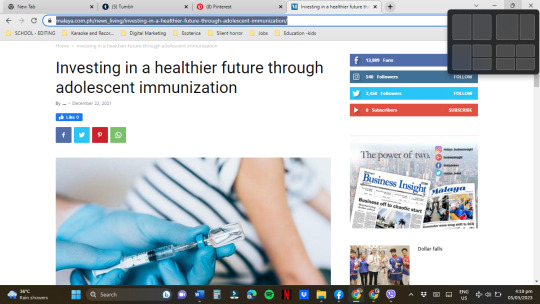





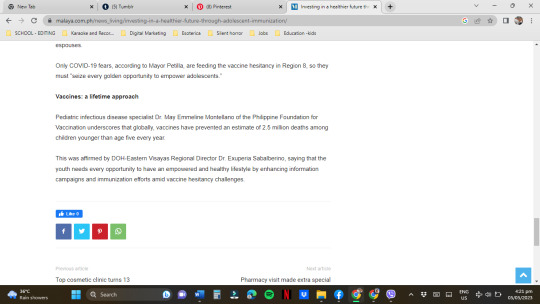
#immunization#adolescent vaccination#Department of Health#DOH#Philippines#COVID-19#Dr. Ma. Teresa Caidic#Dr. Ma. Emma Llanto#Eastern Visayas region#Elena Joy Villarosa RN#Dr. Erwin De Mesa#Mayor Frances Ann Petilla#vaccine hesitancy#Merck Sharp and Dohme#MSD Philippines
0 notes
Text
Review: ‘Under the Skin,’ by Linda Villarosa
In “Under the Skin,” Linda Villarosa disproves once and for all the theory that people of color are responsible for their own failed health care.
from https://ift.tt/E837onD
Check out http://stuck-in-a-fever-dream.tumblr.com
1 note
·
View note
Text
OC in 15 or less Tag
Thank you for the Tag, @cowboybrunch (here)! <3
Rules: Share 15 or fewer lines of dialogue from an OC, ideally lines that capture the character/personality/vibe of the OC. Bonus points for just using the dialogue without other details about the scene, but you're free to include those as well!
I'm doing half of this for my OC Cory Blythe, from Mutant Inquiries, and the other half for Augustus Grimmure, from Enchanted Illusions for this tag!
Cory Blythe
"Listen, douchebag, I'm far too sober to deal with whatever this bullshit is right now and I'm already running late for my fucking job - by the way, I'm far more scared of my boss than I am of you. So how about you go mug someone else and I don't stab you with these heels?"
"And you seriously thought involving 'Miss Trust Fund' over here in our mess was a good idea? No! You just signed our early death certificate." [...] "Why? Oh my god, I don't know, Becky... maybe because her infamously overprotective dad is the CEO of a fucking multimillionaire enterprise and you just dragged his only daughter to the middle of a conspiracy?! I don't care if she wants to help! That's Violet Villarosa, for fuck's sake. We're dead now, we're so dead - I'll have a closed casket for sure."
"The more I live, the more I realize I might be the sanest person in this group of idiots. And that scares me."
"Are any of you going to explain why there's a random dude bleeding out in my brand-new car? No? Okay then."
"Becky," [they take a deep breath] "My best friend, my surrogate sister, the caffeinated cutie-pie of my life, I say this in the most polite way possible - I'd rather be waterboarded with lava than hear that plan ever again."
"Teague, let's make one thing very fucking clear - I'm following my side of the contract, so you can do whatever you want to me in the meantime. But my friends - my family - they're off limits, and if I ever find out you sent any one of your thugs after Rebecca or any of them again, it'll be the last goddamn thing you do. I don't care if you're the head of the mob, or if I'll be food for the fishes afterward - you're not the only one here with a pocketknife, fucker."
"I call dibs on the fluffy socks and the cereal!"
"Look, just because I'm not a mutant like you guys doesn't mean I can't seriously fuck somebody up with a shotgun. Now, one of you might want to take the wheel of this car 'cause I'm about to do just that."
Augustus Grimmure
Augustus felt rejuvenated - like he’d just woken up from a nice nap, adjusting his bloodstained dapper suit and glaring at the now soulless corpse. “Oh -" He looked down, noticing the crimson splatters on his coat "That’s just nonsense! Look at this, it's all ruined and covered in blood! It was my new suit! How dare he stab me.”
"My, my, it's a great deal of a fall from up here. I'm not so sure about this anymore, Hattie-" He looked over the speeding train's railing, turning to Harriet with a shaky, nervous chuckle. As he did, he noticed the outline of the two goons clambering into the wagon behind them, guns ready. "Oh, well, as some say - ladies first!" Before she could say anything, Augustus pushed her over the railing - summoning a portal beneath her. Two bullets flew past the spot where she'd just been standing, instead lodging themselves in the young necromancer, who jumped into the portal just before it closed.
"Well, you could attack us, boys, and I'll merely consume all your souls - string by string, painstakingly severing the cord between your life and afterlife until you're all empty husks. You know who I am, and what I can do to mercenaries who threaten people I hold dear." His eyes glowed in the dark, the mark on his wrist causing the mercenaries to stumble back in shock, as shadows swirled around him. "Now, are you sure this is a wise decision to make in the name of your boss, a man who was too lazy to even come get his own hands dirty?"
"I can't tell you more about it, love." He shook his head with a dejected smile, clutching his own arms in a vice grip. "About my deal, about the Deathbringer and what I did. I can't. It's, no - they're just too dangerous, and I made a mistake. I fear it... it won't end well."
"For some reason, I don't think your cousin likes me very much, Harriet." Augustus spoke under his breath after Vincent stormed out, a playful but somewhat serious lilt to his words, concerned. [She replies "It's not about you, per se. Vincent doesn't really like anyone"] The necromancer chuckled. "No, this seems so very personal."
"My grandma used to bring me to this place, when I was a kid." He mused, fiddling with the blue flower between his fingers, before placing it inside the book. "For a lonely commoner kid with a strange magic that everyone was afraid of, these dusty books were paradise. A world where maybe I really could be anyone."
"May I have this dance, darling? We may as well enjoy this uppity evening on our own terms, before anyone makes it otherwise."
Tagging - @oh-no-another-idea, @dreaminggoblin, @mitchell-nihil, @starlit-hopes-and-dreams,@yet-another-heathen @talesofsorrowandofruin, @thetruearchmagos, @writernopal, @i-can-even-burn-salad, @clairelsonao3, @little-peril-stories, @memento-morri-writes and @saltysupercomputer
#wip: mutant inquiries#wip: enchanted illusions#oc in 15 tag#writers on tumblr#writerblr#fantasy writing#sci fi writing#character writing#my characters#my writing#writers#my wips#writeblr#writing
11 notes
·
View notes
Text
24 in 2024
I meant to do this in January, but life keeps marching on despite my efforts. I stole this from @aliteraryprincess because it just looks fun!! This is 24 books I want to read in 2024 (not including ones I've already read or am currently reading.) These are in no particular order.
Bronze Drum, Phong Nguyen (fiction) (already own, just unread)
Lady Chatterley's Lover, D.H. Lawrence (classic)
Edward IV: A Source Book, Keith Dockray (nonfiction) (already own, just unread)
Lavinia, Ursula K. Le Guin (fiction) (already own, just unread)
Under the Skin: The Hidden Toll of Racism on American Lives and on the Health of Our Nation, Linda Villarosa (nonfiction)
Modern Paganism in World Cultures: Comparative Perspectives, Michael Strmiska (nonfiction) (already own, just unread)
She Would Be King, Wayétu Moore (fiction) (already own, just unread)
The Peacekeeper, B.L. Blanchard (fiction) (already own, just unread)
Tress of the Emerald Sea, Brandon Sanderson (fiction)
Medieval York, D.M. Palliser (nonfiction)
She Had Some Horses, Joy Harjo (poetry) (already own, just unread)
The Mysteries of Udolpho, Ann Radcliffe (classic) (already own, just unread)
Object Lessons: The Life of the Woman and the Poet in Our Time, Eavan Boland (essays?) (already own, just unread)
Noblewomen, Aristocracy and Power in the Twelfth-Century Anglo-Norman Realm, Susan M. Johns (nonfiction) (already own, just unread)
Hood Feminism: Notes from the Women That a Movement Forgot, Mikki Kendall (nonfiction)
Katherine Parr: Complete Works and Correspondence, Katherine Parr (essays/letters) (already own, just unread)
Daughter of the Moon Goddess, Sue Lynn Tan (fiction) (already own, just unread)
Blood and Roses: One Family's Struggle and Triumph During the Tumultous Wars of the Roses, Helen Castor (nonfiction) (already own, just unread)
If I Were Another: Poems, Mahmoud Darwish (poetry)
Always Italicise: How to Write While Colonised, Alice Te Punga Somerville (poetry)
Black Swim, Nicholas Goodly (poetry)
Sight Lines, Arthur Sze (poetry)
Real Queer America: LGBT Stories From Red States, Samantha Allen (nonfiction) (already own, just unread)
Within the Fairy Castle: Colleen Moore's Doll House, Terry Ann R. Neff (idk how to label this, this is my last pick just for fun) (already own, just unread)
If you want to do this, steal it from me and tag me!
11 notes
·
View notes
Text
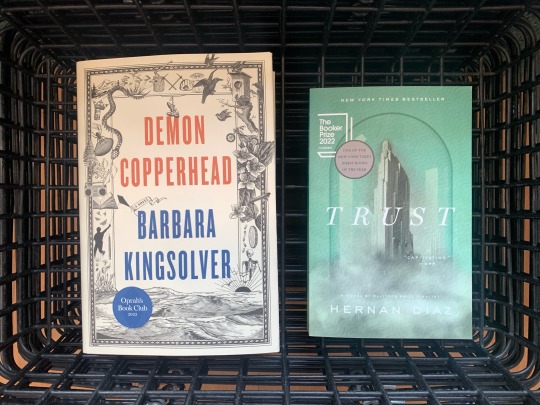
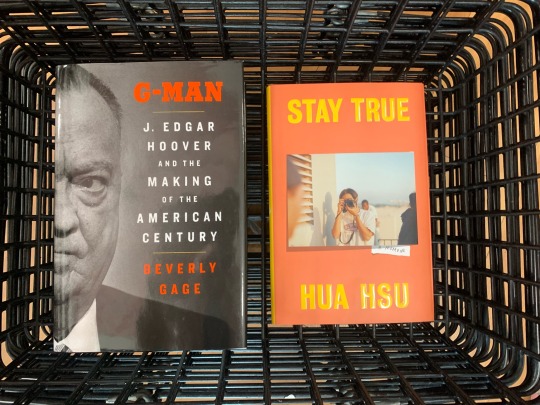

The Pulitzer Prize winners were announced yesterday, amazingly there were two novels chosen for the award for fiction.
Pulitzer Awards for Books, Drama and Music
Fiction
"Demon Copperhead," by Barbara Kingsolver (Harper)
"Trust," by Hernan Diaz (Riverhead Books)
Finalist:
"The Immortal King Rao," by Vauhini Vara (W. W. Norton & Company)
Drama
"English," by Sanaz Toossi
Finalists:
"On Sugarland," by Aleshea Harris
"The Far Country," by Lloyd Suh
History
"Freedom’s Dominion: A Saga of White Resistance to Federal Power," by Jefferson Cowie (Basic Books)
Finalists:
"Seeing Red: Indigenous Land, American Expansion, and the Political Economy of Plunder in North America," by Michael John Witgen (Omohundro Institute of Early American History and Culture/University of North Carolina Press)
"Watergate: A New History," by Garrett M. Graff (Avid Reader Press/Simon & Schuster)
Biography
"G-Man: J. Edgar Hoover and the Making of the American Century," by Beverly Gage (Viking)
Finalists:
"His Name is George Floyd," by Robert Samuels and Toluse Olorunnipa (Viking)
"Mr. B: George Balanchine’s 20th Century," by Jennifer Homans (Random House)
Memoir or Autobiography
"Stay True," by Hua Hsu (Doubleday)
Finalists:
"Easy Beauty: A Memoir," by Chloé Cooper Jones (Avid Reader Press/Simon & Schuster)
"The Man Who Could Move Clouds: A Memoir," by Ingrid Rojas Contreras (Doubleday)
Poetry
"Then the War: And Selected Poems, 2007-2020," by Carl Phillips (Farrar, Straus and Giroux)
Finalists:
"Blood Snow," by dg nanouk okpik (Wave Books)
"Still Life," by the late Jay Hopler (McSweeney’s)
General Nonfiction
"His Name is George Floyd," by Robert Samuels and Toluse Olorunnipa (Viking)
Finalists:
"Kingdom of Characters: The Language Revolution That Made China Modern," by Jing Tsu (Riverhead Books)
"Sounds Wild and Broken: Sonic Marvels, Evolution’s Creativity, and the Crisis of Sensory Extinction," by David George Haskell (Viking)
"Under the Skin: The Hidden Toll of Racism on American Lives and on the Health of Our Nation," by Linda Villarosa (Doubleday)
Music
"Omar," by Rhiannon Giddens and Michael Abels
Finalists:
"Monochromatic Light (Afterlife)," by Tyshawn Sorey
"Perspective," by Jerrilynn Patton
#pulitzer prize#books#award winners#barbara kingsolver#demon copperhead#trust#hernan diaz#harper books#riverhead books#g-man#beverly gage#stay true#hua hsu#his name is george floyd#robert samuels#toluse olorunnipa#viking books#doubleday books
14 notes
·
View notes
Text
fresh reads! get your fresh reads here!
first up: a whopping list of phenomenal 2022 releases from our good friends at NPR!
I'm willing to personally vouch for this list since it contains some of my personal favorites releases from this year, such as The Memory Librarian, The School for Good Mothers, and Lesser Known Monsters of the 21st Century. it's also jam-packed with books I still want to read before the year is up - Disorientation, The Fervor, and Shit Cassandra Saw among them. I've also added a new nonfiction book, Linda Villarosa's Under the Skin, after spotting it here.
and now for a much shorter list, with some much shorter stories:
I've been meaning to check out Sayaka Murata's work for what feels like ever; maybe a short story collection would be a good way to ease in?
and another shorty before you go...
not that I don't love sci-fi and fantasy - I'm especially looking forward to Becky Chambers' new release included on this list, which should surprise exactly no one - but there's also a bit of intriguing horror nonfiction on this list that I didn't expect based on the title. Nina Nesseth's Nightmare Fuel: The Science of Horror Films is favorable compared to Mary Roach and sounds like a pop science delight that I'm going to have to gift to at least one friend.
18 notes
·
View notes
Photo
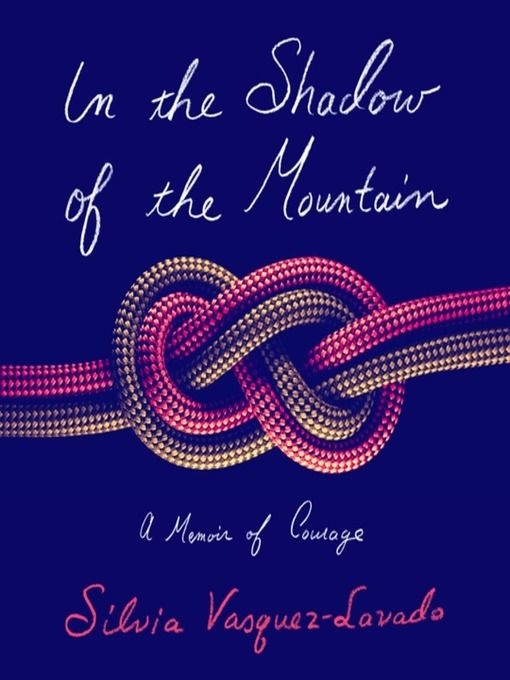
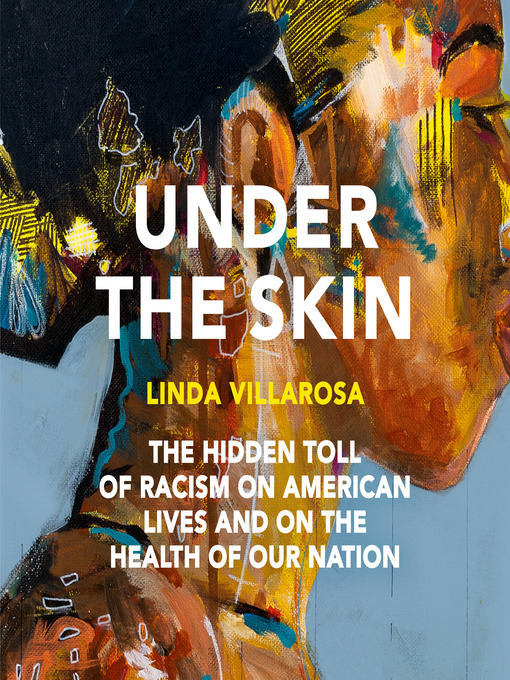
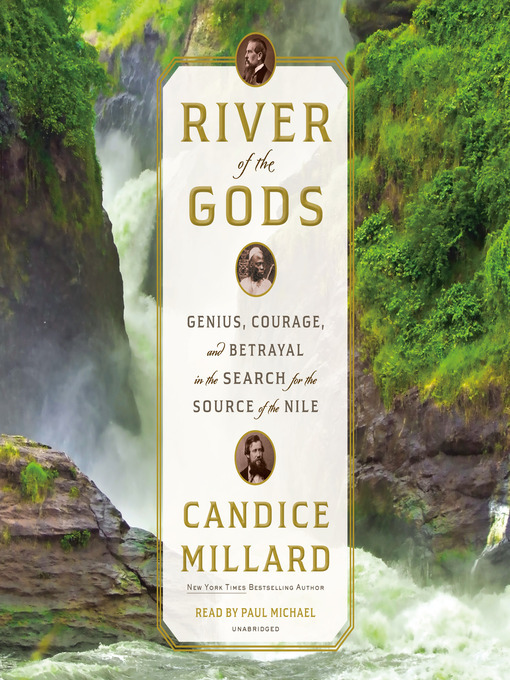

Book Recommendations: New Nonfiction eAudiobooks on Libby
Looking for free access to eBooks or eAudiobooks? Check out Libby, a service from the Rock Island Public Library (RIPL) that can be accessed with your RIPL card number! You can log in to Libby through our website or download it as an app from the Apple Store or Google Play Store.
In the Shadow of the Mountain by Silvia Vasquez-Lavado
Endless ice. Thin air. The threat of dropping into nothingness thousands of feet below. This is the climb Silvia Vasquez-Lavado braves in her page-turning, pulse-raising memoir following her journey to Mount Everest.
A Latina hero in the elite macho tech world of Silicon Valley, privately, she was hanging by a thread. Deep in the throes of alcoholism, hiding her sexuality from her family, and repressing the abuse she'd suffered as a child, she started climbing. Something about the brute force required for the ascent—the risk and spirit and sheer size of the mountains and death's close proximity—woke her up. She then took her biggest pain as a survivor to the biggest mountain: Everest.
"The Mother of the World," as it's known in Nepal, allows few to reach her summit, but Silvia didn't go alone. She gathered a group of young female survivors and led them to base camp alongside her. It was never easy. At times hair-raising, nerve-racking, and always challenging, Silvia remembers the acute anxiety of leading a group of novice climbers to Everest's base, all the while coping with her own nerves of summiting. But, there were also moments of peace, joy, and healing with the strength of her fellow survivors and community propelling her forward.
Under the Skin by Linda Villarosa
In 2018, Linda Villarosa's New York Times Magazine article on maternal and infant mortality among black mothers and babies in America caused an awakening. Hundreds of studies had previously established a link between racial discrimination and the health of Black Americans, with little progress toward solutions. But Villarosa's article exposing that a Black woman with a college education is as likely to die or nearly die in childbirth as a white woman with an eighth grade education made racial disparities in health care impossible to ignore.
Now, in Under the Skin, Linda Villarosa lays bare the forces in the American health-care system and in American society that cause Black people to “live sicker and die quicker” compared to their white counterparts. Today's medical texts and instruments still carry fallacious slavery-era assumptions that Black bodies are fundamentally different from white bodies. Study after study of medical settings show worse treatment and outcomes for Black patients. Black people live in dirtier, more polluted communities due to environmental racism and neglect from all levels of government. And, most powerfully, Villarosa describes the new understanding that coping with the daily scourge of racism ages Black people prematurely. Anchored by unforgettable human stories and offering incontrovertible proof, Under the Skin is dramatic, tragic, and necessary reading.
River of the Gods by Candice Millard
For millennia the location of the Nile River’s headwaters was shrouded in mystery. In the 19th century, there was a frenzy of interest in ancient Egypt. At the same time, European powers sent off waves of explorations intended to map the unknown corners of the globe – and extend their colonial empires.
Richard Burton and John Hanning Speke were sent by the Royal Geographical Society to claim the prize for England. Burton spoke twenty-nine languages, and was a decorated soldier. He was also mercurial, subtle, and an iconoclastic atheist. Speke was a young aristocrat and Army officer determined to make his mark, passionate about hunting, Burton’s opposite in temperament and beliefs.
From the start the two men clashed. They would endure tremendous hardships, illness, and constant setbacks. Two years in, deep in the African interior, Burton became too sick to press on, but Speke did, and claimed he found the source in a great lake that he christened Lake Victoria. When they returned to England, Speke rushed to take credit, disparaging Burton. Burton disputed his claim, and Speke launched another expedition to Africa to prove it. The two became venomous enemies, with the public siding with the more charismatic Burton, to Speke’s great envy. The day before they were to publicly debate,Speke shot himself.
Yet there was a third man on both expeditions, his name obscured by imperial annals, whose exploits were even more extraordinary. This was Sidi Mubarak Bombay, who was enslaved and shipped from his home village in East Africa to India. When the man who purchased him died, he made his way into the local Sultan’s army, and eventually traveled back to Africa, where he used his resourcefulness, linguistic prowess and raw courage to forge a living as a guide. Without Bombay and men like him, who led, carried, and protected the expedition, neither Englishman would have come close to the headwaters of the Nile, or perhaps even survived.
And Finally by Henry Marsh
As a retired brain surgeon, Henry Marsh thought he understood illness, but he was unprepared for the impact of his diagnosis of advanced cancer. And Finally explores what happens when someone who has spent a lifetime on the frontline of life and death finds himself contemplating what might be his own death sentence.
As he navigates the bewildering transition from doctor to patient, he is haunted by past failures and projects yet to be completed, and frustrated by the inconveniences of illness and old age. But he is also more entranced than ever by the mysteries of science and the brain, the beauty of the natural world and his love for his family. Elegiac, candid, luminous and poignant, And Finally is ultimately not so much an audiobook about death, but an audiobook about life and what matters in the end.
#nonfiction#history#biography#memoir#audiobooks#ebooks#Libby#Library Books#Book Recommendations#book recs#Reading Recs#reading recommendations#TBR pile#tbrpile#to read#Want To Read#Booklr#book tumblr#book blog#library blog#new library books
3 notes
·
View notes
Text
AAMC: Racism — not race — drives health disparities
When Linda Villarosa was pregnant with her daughter, she was surprised when her doctor recommended she go on bed rest and interrogated her about her health habits because her unborn baby was not growing as expected.
Villarosa, who had served as an editor for Essence, a lifestyle magazine for Black women, had written about healthy habits and strove to live a healthy life herself. She’d encouraged other Black women to change their diets and exercise regimens to help combat health disparities.
But despite her efforts, her baby was born at a low birth weight — an issue that impacts Black parents and babies at disproportionately high rates in the United States, even when accounting for education and socioeconomic status.
“How did my lived experience [as a Black woman in America] affect my own [birthing experience]?” Villarosa recalled wondering, speaking to attendees of Learn Serve Lead 2022: The AAMC Annual Meeting on Nov. 13 in Nashville, Tennessee.
Her personal experience was reflected in the data she gathered and the personal stories she encountered during her reporting for the New York Times Magazine on maternal mortality rates and disparities in this country and in writing her book, Under the Skin: The Hidden Toll of Racism on American Lives and on the Health of Our Nation.
“There has never been a time in this country when Black people have had equal health to White people and often other people of color,” Villarosa said.
She identified the sources of myths about Black bodies and people that, throughout American history, have labeled them as inferior and not needing or worthy of appropriate care: the so-called “father of modern gynecology,” J. Marion Sims, who operated on enslaved women without anesthesia, contributing to the myth that Black people do not feel pain as acutely as White people; Thomas Jefferson, who likely perpetuated the myth that Black people had inferior lung function to White people; and countless medical journals that validated racist studies as evidence-based science.
These myths have seeped into today’s health systems, contributing to persistent biases that label Black people as lazy and aggressive and make them less likely to receive appropriate health care, Villarosa said.
But the outlook isn’t all bleak, she added.
Medical students who are working to make anti-racism a priority at their institutions and administrators who respond to those calls to action give her hope for the future of medicine.
“They’re the future,” she said. “They’re the ones trying to know better and do better.”
Several weeks ago, Villarosa spoke with AAMCNews about her research and how academic medicine can foster change.
What role have you found racism itself, as opposed to socioeconomic status, plays in racial health disparities?
It’s the long-standing idea that it was something about the Black body or something about Black culture that was causing poor health outcomes and racial disparities, that it was genetics — in other words, that we were inferior in some ways to White people, whether it was a lack of education or high levels of poverty, with less interrogation of societal and institutional barriers. So that’s why I really set out to write the book — to disprove that there’s something wrong with us in some inherent way. And the first chapter is basically called, “Everything I thought was wrong,” because I believed that too.
When I was a young editor at Essence, I was really looking at these poor health outcomes and looking at racial health disparities obsessively and thinking if I just tell people or help educate people that are reading Essence magazine, who are in the millions, that we can change the health outcomes of Black people in the country. And my idea was, "If you know better, you do better." Then I realized, after going to public health school and really doing a lot of reporting in this area, that this kind of one-note idea that it was just poor people who were sick was wrong. And it really came to the front of my mind in 2017, when I was reporting on maternal and infant mortality among Black women for the New York Times Magazine and I started seeing these statistics that said we’re the only country where the number of birthing people and pregnant people who die or almost die related to pregnancy and childbirth is rising. And that Black women are three to four times more likely to die or almost die, and then that a Black woman with a master’s degree or more is still more likely to die or almost die than a White woman with an eighth-grade education. And I started to [think], “Wait, this cannot be only about education or lack of money or 'if you know better, you do better.' There's something else going on.”
Can you share any stories about how structural racism plays out in the health care system?
Well, I think I just want to mention two of them. The first is Simone Landrum, whom I was following for my 2018 story “Why America’s Black Mothers and Babies Are in a Life-or-Death Crisis.” When I met her, she had two children. She had just lost a baby and almost died, at least partially because her doctor didn’t listen to her and her legitimate complaints.
And then when I was at her child’s birth, I saw that happening again. I was in the labor and delivery room watching the medical providers who were all White really treat her with disrespect, ignore the things she was saying, and not treat her with the kind of care and kindness you would treat someone who had gone through a trauma the year before with a stillborn baby. … And I saw how distressed she was, and that kind of distress impacted her body and her baby. Luckily, she had a healthy baby, but I still was so surprised that everything I’d been researching unfolded in front of me.
Then when my current book Under the Skin was reviewed in the New York Times Book Review, it was a Black woman writing about the book and in the middle of the review, she talked about her own birth[ing experience], and she said that she had read my 2018 story and she was trying to do everything right. She was expecting to have a positive birth outcome, but how she herself was treated during the process led her to question herself, to blame herself, and to ultimately be happy that she had a healthy baby but also feel bad about the process and the experience. And I was surprised because right in the middle of a book review, it’s unusual to get this kind of really intense, personal story, but I appreciated it and it really confirmed much of what I have been looking into for the last few years.
Why do you think there is resistance to seeing racism as a health risk factor?
Well, I think it’s in the DNA of American character to assume that everybody has responsibility. They’re responsible for themselves and for their own health, wealth, and well-being, without questioning the forces of society and discrimination and other kinds of harm that are baked into the system. And it’s almost “un-American” to say anything bad about the country. What I learned, especially working on the [New York Times] 1619 Project, was it is Black folks who are questioning what’s going on in America and who are demanding a closer look at it, not because we don’t like the country, but because we care and want to engage in the system and work toward social change.
When I talk about discrimination and racism in the health care system itself, I’m very careful to cite a lot of evidence — and there is a lot out there — because I don’t want it to feel like I’m accusing individual physicians, nurses, midwives, health care providers, or policymakers of racism, because it’s not a question of individuals blaming individuals for their own health. It’s also not fair to blame individual health care providers for a problem in the system. And I think one of the solutions is to just admit that something is going on that is giving marginalized people a bad experience when we enter the health care system — not always but too often, and it’s been well documented. So it’s time to stop looking away from the problem and to figure out how to face it. One of the things that I’m really interested in is hospital systems and health care commissions mandating anti-racism or anti-bias, implicit bias training for its employees and to say everyone needs to go through this just as a matter of course to make sure we’re not poisoning the experience and the service that we’re giving people because they’re different from us. And I think there is a growing awareness of this and a growing acceptance of this as a solution.
What can medical schools do to start making these changes?
One thing to focus on is listening to students themselves. Many students who are in medical school and nursing school and midwifery school right now were learning about racism and discrimination against people of color — especially Black people — in high school or in college. So many of them are very aware of this and are wanting to do better and to be a different kind of provider and not take the old biases and prejudices into their practices-to-be. I think that’s really exciting, that there’s this swell of students who are trying to make a difference. And I think there are also medical educators and people that work on training medical students and nursing students who are trying to make a difference, and we have to lift up these stories and hold them up and say thank you and I’m really excited about that.
We know that medical research has abused people of color. Is there anything you’d like to see change in academic research to gain trust and stop perpetuating discrimination and abuse?
When you talk about vaccine hesitancy or Black people reluctant to enter the health care system or avoiding it, there’s this discussion of the Tuskegee syphilis study — which was in the 1930s through the 1970s — without much thought about how many people are reluctant to enter the health care system because something happened to them yesterday or something happened last week to someone that they love when they went to a doctor or went to some kind of health care provider, whether it was an extremely long wait or it was disrespect. And I think one of the things to think about is to listen to the stories. Oftentimes, I’ve seen where hospital systems, sometimes where I did initial reporting — I went back and they’re doing a restorative justice project to both acknowledge the stories of harm and to teach the people who are working in these systems that are often busy and hurried and sometimes underfunded that you have to listen to the folks’ stories and do better and not make the same mistakes over and over.
I think one thing that I learned over the last few years doing lectures and listening to seminars about these topics is how often Black researchers are overlooked, even when the research is about topics of interest to Black people or about diseases or problems that affect us. And I think we also have to look at who gets to study what and whose research is lifted up and whose gets celebrated — and even published. That’s one thing that I didn't know so much about, but I heard heartbreaking stories from Black researchers talking about how they were overlooked and how their research was less respected than other researchers’, even when the topic was something about Black people. So I think it’s important to also look at the ways we choose who is published and who is celebrated and who isn't.
#Racism — not race — drives health disparities#us health disparities#health disparities in Black and White#Black Lives Matter#Black Health Matter#US Racism Racism drives health disparities
3 notes
·
View notes
Photo
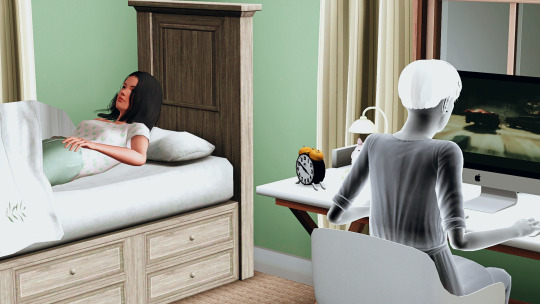
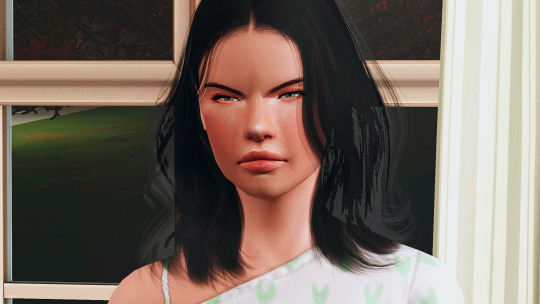

loool perfect time for loren to show up on spooky day
22 notes
·
View notes
Text
ROMANO NERVOSO: The “Godfather of Spaghetti Rock” is Back with Album Number Five and New Single on MOTTOW SOUNDZ
From Villarosa to Rotherham by Romano Nervoso is released 8th March | Pre-orderIn just a few short years Romano Nervoso and his Italian-Belgian band of ne’er-do-wells have torn up the Italian music scene at full tilt boogie. From local bars and taverns to some of the biggest concert venues and festivals across Europe, the undisputed ‘Godfather of Spaghetti Rock’, with his charismatic onstage…
View On WordPress
0 notes